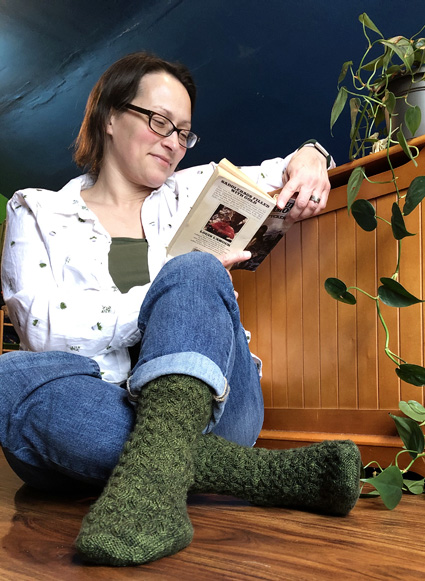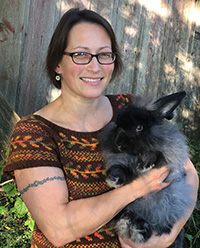Philodendron, a free knitting pattern from Knitty.com. Free knitting pattern for a top-down lace sock.
INTRODUCTION
Philodendron
 by Stefanie Johnson
by Stefanie Johnson
![]()
I am a plant lover, but I must admit that my plants suffer when I get busy and focus on the people and animals (and knitting) in my life! For this reason, I LOVE Philodendron plants. I find them practically impossible to kill from neglect. I have gone months without watering the vining plants, and when somebody mentions that it looks sad over in the corner, I water the Philodendron and it seems to spring back to life!
These lacework socks were inspired by the trailing Philodendron plant, with columns of alternating leaves that flow down the leg right to the toe. Rather than a heel flap, the gusset is created by adding stitches between the instep and heel stitches while working in the round, then short rows are worked on the heel before resuming in the round to finish the foot and toe. The instep decreases are worked in part by completing leaves without beginning new ones. There is a bit of shaping to the arch as well, and the socks are worked in a light fingering weight yarn to decrease bulk from the embossed feel of the leaves for an easier fit inside your shoes.
 model: Stefanie Johnson
model: Stefanie Johnson
 photos: Sam Johnson
photos: Sam Johnson
SIZE
Adult S[M, L]
FINISHED MEASUREMENTS
Foot circumference: 6[7, 8] inches/ 15[18, 20.5] cm unstretched
Leg Length: 5.5 inches/14 cm as shown, adjustable by 1 inch/2.5 cm increments according to preference
Choose a size with approximately 2 inches/5 cm negative ease in foot circumference.
MATERIALS
Yarn
![]() Black Sheep Dyeworks [superwash merino; 428 yd/391 m per 3.5 oz/100 g skein]; color: Moss Tonal; 1[1, 2] skeins
Black Sheep Dyeworks [superwash merino; 428 yd/391 m per 3.5 oz/100 g skein]; color: Moss Tonal; 1[1, 2] skeins
Recommended needle size
[always use a needle size that gives you the gauge listed below - every knitter's gauge is unique]
![]() US #1/2.25 mm needles for small circumference in the round: traditional or flexible DPNs, 1 long circular for magic loop, or 2 smaller circulars
US #1/2.25 mm needles for small circumference in the round: traditional or flexible DPNs, 1 long circular for magic loop, or 2 smaller circulars
Notions
![]() stitch markers
stitch markers
![]() yarn needle
yarn needle
GAUGE
35 sts/50 rounds = 4 inches/10 cm in stockinette stitch
44 sts/50 rounds = 4 inches/10 cm in pattern stitch
Note: gauge is always taken after blocking.
PATTERN NOTES
[Knitty's list of standard abbreviations and techniques can be found here.]
Techniques:
- Twisted German CO
- Kitchener Stitch
- Grafting: here and here.
Leg Pattern
Worked over 12 stitches, increasing to 13. Work from written or charted instruction as you prefer.
Round 1: P1, k1, k2tog, k4, p2, yo, k1, yo, p1. 13 sts.
Round 2: P1, k1, k2tog, k3, p2, k3, p1. 12 sts.
Round 3: P1, k1, k2tog, k2, p2, (k1, yo) twice, k1, p1. 13 sts.
Round 4: P1, k1, k2tog, k1, p2, k5, p1. 12 sts.
Round 5: P1, k1, k2tog, p2, k2, yo, k1, yo, k2, p1. 13 sts.
Round 6: P1, k2tog, p2, k7, p1. 12 sts.
Round 7: P1, yo, k1, yo, p2, k1, k2tog, k4, p1. 13 sts.
Round 8: P1, k3, p2, k1, k2tog, k3, p1. 12 sts.
Round 9: P1, (k1, yo) twice, k1, p2, k1, k2tog, k2, p1. 13 sts.
Round 10: P1, k5, p2, k1, k2tog, k1, p1. 12 sts.
Round 11: P1, k2, yo, k1, yo, k2, p2, k1, k2tog, p1. 13 sts.
Round 12: P1, k7, p2, k2tog, p1. 12 sts.
CHARTS
Toe: Small | Medium | Large
Instep/Gusset/Heel: Small/Medium | Large
Leg/Foot: All sizes
DIRECTIONS
Cuff
Using the German twisted method, CO 60[72, 84] sts. Distribute sts across needles as you prefer and join for working in the round.
Ribbing round: [(P1, k3) two times, p2, k1, p1] around.
Work Ribbing as set for 12 rounds total.
Leg
Leg round: Work Lace Pattern around.
Continue until you have worked 12 rounds of the Lace Pattern 4 times, then work Rounds 1-10 once more.
If longer socks are preferred, working an additional chart repeat will provide about 1 inch/ 2.5cm additional length.
Gusset & Heel
Next round: Work Instep Chart across first 31[43, 43] sts; work Heel Chart for appropriate size across rem 29[29, 41] sts, to end of round.
Work as set until Round 38 of both charts are complete.
Next round, set up for Heel Turn: Work Round 39 of the Instep chart, and stop here.
46[59, 59] sts on instep; 31[31, 43] sts on heel.
Heel Turn:
Starting at end of Instep stitches, proceed:
Row 1 [RS]: Slp1, k 17[17, 22] , ssk, turn. 1 st decreased.
Row 2 [WS]: Slp1, p 6[6, 4] , p2tog, turn. 1 st decreased.
Row 3: Slp1, LLI, k 6[6, 4] , RLI, ssk, turn. 1 st increased.
Row 4: Slp1, p 8[8, 6] , p2tog, turn. 1 st decreased.
Row 5: Slp1, LLI, k 8[8, 6] , RLI, ssk, turn. 1 st increased.
Row 6: Slp1, p 10[10, 8] , p2tog, turn. 1 st decreased.
Row 7: Slp1, LLI, k 10[10, 8] , RLI, ssk, turn. 1 st increased.
Row 8: Slp1, p 12[12, 10] , p2tog, turn. 1 st decreased.
Row 9: Slp1, LLI, k 12[12, 10] , RLI, ssk, turn. 1 st increased.
Row 10: Slp1, p 14[14, 12] , p2tog, turn. 1 st decreased.
Row 11: Slp1, LLI, k 14[14, 12] , RLI, ssk, turn. 1 st increased.
Row 12: Slp1, p 16[16, 14] , p2tog, turn. 1 st decreased.
Row 13: Slp1, LLI, k 16[16, 14] , RLI, ssk, turn. 1 st increased.
Row 14: Slp1, p 18[18, 16] , p2tog, turn. 1 st decreased.
Row 15: Slp1, LLI, k 18[18, 16] , RLI, ssk, turn. 1 st increased.
Row 16: Slp1, p 20[20, 18] , p2tog, turn. 1 st decreased.
Row 17: Slp1, LLI, k 20[20, 18] , RLI, ssk, turn. 1 st increased.
Row 18: Slp1, p 22[22, 20] , p2tog, turn. 1 st decreased.
Row 19: Slp1, LLI, k 22[22, 20] , RLI, ssk, turn. 1 st increased.
Row 20: Slp1, p 24[24, 22] , p2tog, turn. 1 st decreased.
Row 21: Slp1, LLI, k 24[24, 22] , RLI, ssk, turn. 1 st increased.
Row 22: Slp1, p 26[26, 24] , p2tog, turn. 1 st decreased.
Row 23: Slp1, LLI, k 26[26, 24] , RLI, ssk, turn. 1 st increased.
Row 24: Slp1, p 28[28, 26] , p2tog, turn. 1 st decreased.
Row 25: Slp1, LLI, k 28[28, 26] , RLI, ssk, turn. 1 st increased.
Row 26: Slp1, p 30[30, 28] , p2tog, turn. 1 st decreased.
Row 27: Slp1, LLI, k 30[30, 28] , RLI, ssk, turn. 1 st increased.
Row 28: Slp1, p 32[32, 30] , p2tog, turn. 1 st decreased.
Row 29: Slp1, LLI, k32[32, 30], RLI, ssk, turn. 1 st increased.
Row 30: Slp1, p 34[34, 32] , p2tog, turn. 1 st decreased.
Row 31: Slp1, LLI, k 34[34, 32] , RLI, ssk, turn. 1 st increased.
Size S & M: move onto Arch Shaping. 38[38, -] sole sts, 38[51, -] instep sts.
Size L only:
Row 32: Slp1, p34, p2tog, turn. 1 st decreased.
Row 33: Slp1, LLI, k34, RLI, ssk, turn. 1 st increased.
Row 34: Slp1, p36, p2tog, turn. 1 st decreased.
Row 35: Slp1, LLI, k36, RLI, ssk, turn. 1 st increased.
Row 36: Slp1, p38, p2tog, turn. 1 st decreased.
Row 37: Slp1, LLI, k38, RLI, ssk, turn. 1 st increased.
Move onto Arch Shaping. 42 sole sts, 59 instep sts.
Arch Shaping:
Row 1 [WS]: Slp1, p 36[36, 41] , p2tog, turn. 1 st decreased.
Row 2 [RS]: Slp1, LLI, k8, k2tog, k 16[16, 21] , ssk, k8, RLI, ssk, turn. 1 st decreased.
Repeat these 2 rows 6[8, 5] more times.
All heel sts have been worked, 62[71, 89] sts remain, 38[38, 42] sole sts and 24[33, 47] instep sts.
Foot
Resume working in the round.
Foot Round: P 2[0, 0] , work Foot patt as charted (using appropriate size chart) across 20[33, 47] sts, working repeat 1[2, 3] times, p 2[0, 0] , pick up 1 st to close gap where instep meets sole and knit it tog with next st, k to end of rnd.
Continue to work in patt as set until sock is 1.75[1.5, 2.5] inches/ 4.5[4, 6] cm less than desired length, ending with a Round 3[9, 9] of Foot patt/chart on the instep. Each 12-round repeat should give 1 inch/ 2.5cm of sock length. 63[69, 86] sts.
Toe
Note: The outermost leaves are switched to p sts as they are completed until all sts are p on instep. Decreases start on sole only, then decreases begin on the instep sts as well once the sole and instep st counts match. At start of toe, 25[31, 41] instep sts, 38[38, 42] sole sts.
Work Toe chart for appropriate size. 22[26, 26] sts rem.
FINISHING
Cut yarn, leaving a 12 inch/ 30 cm tail. With yarn needle, graft toe sts closed using Kitchener stitch.
Weave in ends.
Handwash and wet block the socks by soaking them in warm water with wool wash for a few minutes, then pressing excess water out of them by wrapping them in a towel and squeezing them. Finally, place them on sock blockers to dry and to open up the lace.
ABOUT THE DESIGNER
 When she is not educating her community on how to minimize the spread and impact of COVID-19 and other communicable diseases, Stefanie enjoys creating unique items and helping others learn to spin, knit and weave. The Johnsons raise French Angora rabbits, honeybees and a variety of chickens and ducks on their hobby farm Settlers Grove, Illinois.
When she is not educating her community on how to minimize the spread and impact of COVID-19 and other communicable diseases, Stefanie enjoys creating unique items and helping others learn to spin, knit and weave. The Johnsons raise French Angora rabbits, honeybees and a variety of chickens and ducks on their hobby farm Settlers Grove, Illinois.
More of Stefanie's work can be found in Spin Off magazine, in Knotions and on Ravelry.
Pattern & images © 2020 Stefanie Johnson